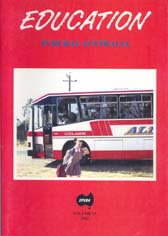Education in Rural Australia Vol 13, No 2 (2003)
Journal Papers
The Rural Population Transformation and Education in Australia
David McSwan, School of Education, James Cook University
Abstract
This paper aims to relate the Australia data on rural-urban migration and economic change to education. It illustrates that there has been scant policy attention to the fundamental role of education in the changing nature of Australia’s rural areas. Australia’s rural policy has been firmly driven by the massive political power of the rural industries and mining lobbies; the voice of rural communities being lost to the winds. Governments should be alert to the needs or rural Australia. Issues of social justice and equity are being raised and heard as never before and ordinary Australians are increasingly aware of, and cherish, our rural communities, our rural image, and or sense of ourselves as sharing a rural heritage. Recent data show that regional Australia, in favoured areas, is prospering. A number of policy considerations are canvassed with the conclusion that leading-edge information and communications technologies are an essential prerequisite if regional Australia is to prosper and metropolitan areas and the south-east are to avoid undesirable crowding. Isolated rural areas are more problematic and a policy approach to a sustainable future for them is not immediately apparent to the author.
The place and meaning of physical activity, physical education, and physical culture in the lives of young people living in rural Queensland
Jessica Lee, School of Human Movement Studies, University of Queensland
Abstract
Young people living in rural and regional areas are often reported as being less physically active than are young people living elsewhere. An understanding of this phenomenon will inform policies and strategies to address this finding. One source of valuable information is a qualitative understanding of how social relations and cultural meanings influence young people’s opportunities and choices in relation to physical activity as told by young people themselves. It is envisaged that this information will inform the development of school curricula to engage young people and which will enable schools, community groups and governments to collaborate in meeting the needs of young people living in rural Queensland.
German Lutherans and the ‘English’: culture, conflict and building a one-room school in the Wimmera 18731881
Peter Rushbrook, Charles Sturt University
Abstract
The paper is an edited version of a paper delivered to the ‘Country Schooling: Old Stories, New Lessons’ Conference at the University of Iowa, USA, 2729 June 2002. It explores tensions between German and English settlers in establishing a oneroom school in Murtoa, a hamlet in Victoria’s Wimmera district, between 18731881. The narrative reveals some broader themes of the period relating to the establishment of a statebased ‘Free, Compulsory and Secular’ education system, the challenges associated with building schools in remote rural areas, and the related hardships faced by teacher.
Partners and Pathways in Education: The Whyalla Model
Janet Sawyer, Business and Enterprise, University of South Australia Whyalla Campus Pam Zubrinich, Business and Information Services, Spencer Institute of TAFE John Carter, Business Education, Enterprise and Vocational Education, Edward John Eyre High School
Abstract
This paper describes the educational relationships that have been established between three key educational institutions within the regional city of Whyalla in South Australia. Edward John Eyre High School, Spencer Institute of TAFE and the Whyalla Campus of the University of South Australia have formed a partnership to promote the educational pathways available in the area of Business Studies. The regional educational opportunities created will assist in retaining young people who wish to study in the business field as well as encourage graduates to remain within their local communities. This important initiative embraces the rationale of successful learning communities and aims to develop skilled professional business people who will become future leaders in business and enterprise and contribute to the economic and social success of regional South Australia.
